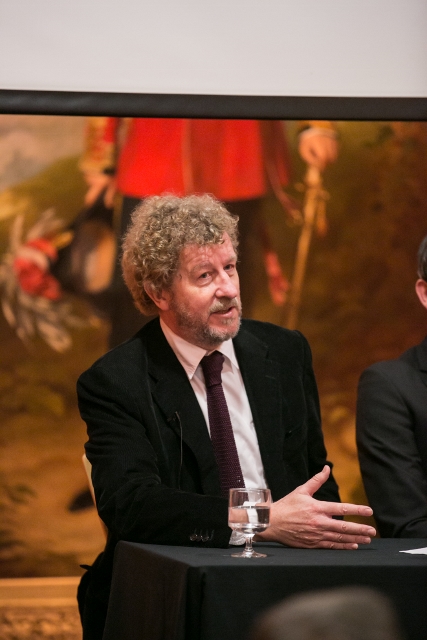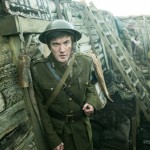It will come as no surprise that Sebastian Faulks’ sweeping, moving and celebrated novel Birdsong will be the prism through which many people will explore the First World War in this anniversary year. It may surprise that the play is now in its fourth incarnation; for script writer Rachel Wagstaff, this play was a labour of love that she knew would work on stage. The trouble was that her first read-through version was four hours long. After much work and close collaboration with the author, her vision paid off and the play is now on a long national tour until July.
Wagstaff approached Faulks in 2006 to ask permission to adapt the novel. And his reaction? ‘It was puzzlement, I’d say. I wondered why you’d want to turn one thing which had proved to be perfectly satisfactory as a novel into something else. I was puzzled and I was also sceptical. Birdsong is quite a novelistic novel: it draws upon all the techniques of fiction. But Rachel argued her case very persuasively because she could see where it could be made to work. So I said OK.
‘When I had a look at the first draft, I saw that Rachel had understood the book and I felt that there was potential in what she’d done. The difficulty was that I’m a bit all or nothing. Being a novelist, you are the god of the world you have created. You are in complete control, down to the smallest freckle on the nose of one of your characters.
‘I talked to Rachel about the themes and ideas and the history behind the book. I also made occasional one word suggestions but all the rest of it, the middle ground as it were, and especially the dramatic construction, I left to Rachel.’ Had he found it easy, as a ‘god figure’, to hand over a measure of his authority to his collaborator?
‘It’s a case of Good Cop, Bad Cop. Rachel is very obliging and hard-working and I’m the opposite,’ Sebastian chuckles. ‘It’s exceedingly helpful that Rachel’s strengths flow from her background in the theatre. It means that she understands the mechanics of what you can do and what you cannot do.
‘I know all these people inside out – the people who inhabit my novels. In a sense, I’m both uncritical of my work and hypercritical of what others have done to it,’ argues Faulks. ‘In the case of Birdsong, the book and the play remain very different and the further the play has gone verbally from the book, the more effective it has become. Some of the West End reviews have said that the play was too reliant on phrases and sentences from the book and the play has to exist on its own terms. I think they had a point and it does now.’
Birdsong went through various stages of development, including a workshop and a reading at the Old Vic in which Stephen, the hero of the story, was played by Tom Hiddleston. A number of West End producers teamed up to present the play at the Comedy Theatre, directed by Sir Trevor Nunn, where it opened in good health but at considerable length.
Faulks says: ‘Both Rachel and I want this to be the definitive version of Birdsong on stage. The audience watch it and think, thank God I have never undergone all of this. These experiences are far outside the lives of most people but there is something about the way the production works which makes people identify and think, it could be me…’ The collaboration is a new stage in Faulks’ working life. From the age of 14, he knew that he wanted to be a writer. Inspired by Charles Dickens and D H Lawrence, he set his heart on pursuing a life as a novelist. He was educated at Elstree School near Reading which he described as ‘demanding and old-fashioned’ but he was a good student, moving on to Wellington College and afterwards to Emmanuel College, Cambridge, where he read English.
When he graduated in 1974, Faulks moved to Bristol for a year, writing, and then on to London where he took a job as a teacher in a private school in Camden Town. Two years later he joined the New Fiction Society, an Arts Council organisation that aimed to stimulate sales of literary fiction, and then started to write for a living proper as a reporter on the diary column of the Daily Telegraph. He also wrote for The Sunday Times, The Spectator and Books and Bookmen; and later became Literary Editor of The Independent.
Earning by day and writing at night, he finally produced something he felt could be published. His publisher agreed and Faulks recalls the moment: ‘I got the news in a phone booth on Holborn Viaduct. It was a good moment; it felt like the beginning of something at last, after a long and occasionally dispiriting apprenticeship.’
A Trick of the Light was followed by The Girl at the Lion d’Or. By the time Birdsong, his fourth novel, was published in 1993, he was able to write full time. The novel is considered one of the finest written in years, and is now studied in schools on the English and History schemes of work.
‘There’s no doubt that it struck a chord,’ says Faulks. ‘But it was a lot to do with the timing. I sensed that this was the moment to do it twenty years ago. I felt at the time that I was really too young but that I also had the necessary youthful bravura to pull it off. I could easily have fallen flat on my face and perhaps ten years later, I wouldn’t even have taken it on. But at that time the last survivors of the First World War were still with us. So I was able to meet them and talk to them and, in a sense, to get their blessing – to have the book validated, in some way.’ A hundred years on, the First World War still casts a long shadow upon us and Faulks says that the anniversary may lead to a reassessment of its significance. ‘Over the next four years, we will revisit the First World War and rethink it,’ he says. ‘The big thing about these four years is how it changed our view of the nature of who we are. I’d argue that the subsequent turmoil of the twentieth century prevented us from digesting the implications of what the Great War signified and perhaps now we have a chance to do that.’
Faulks’ indirect foray into the theatre may owe something to his grandmother, a repertory actress whom he never met. His mother, Pamela, regularly took Sebastian and his brother Edward to plays and Sebastian recalls seeing Laurence Olivier in a celebrated performance as Othello at London’s Old Vic Theatre. He also took part in school productions. ‘The theatre was a big part of my growing up, although I was a pretty poor actor myself,’ he confesses.
One of the parts Faulks played was Pastor Manders, the self-righteous clergyman in Ibsen’s Ghosts, and he returned briefly to the stage in Brighton last year, to celebrate the 200th show of the touring production of Birdsong. ‘I had six lines, playing a sapper called Cartwright,’ he reports proudly. ‘But I managed to forget one of them.’ He received an award from the cast for ‘best cameo’, and clearly now has the bug.
For details of the tour visit: www.birdsongthetour.com. Additional reporting by Lesley Finlay




